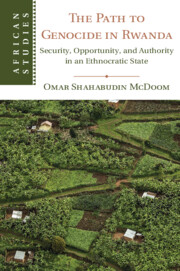Book contents
- The Path to Genocide in Rwanda
- African Studies Series
- The Path to Genocide in Rwanda
- Copyright page
- Contents
- Figures
- Tables
- Acknowledgements
- Abbreviations
- 1 What We Do and Do Not Know
- 2 An Extraordinary Baseline
- 3 Security: War-Time Threat
- 4 Threat and Opportunity: The Dangers of Freedom
- 5 Opportunity II: Death of the Nation’s Father
- 6 Authority: Rwanda’s Privatized and Powerful State
- 7 Why Some Killed and Others Did Not
- 8 Conclusion: Rwanda in Retrospect
- References
- Index
- African Studies Series
6 - Authority: Rwanda’s Privatized and Powerful State
Published online by Cambridge University Press: 26 October 2020
- The Path to Genocide in Rwanda
- African Studies Series
- The Path to Genocide in Rwanda
- Copyright page
- Contents
- Figures
- Tables
- Acknowledgements
- Abbreviations
- 1 What We Do and Do Not Know
- 2 An Extraordinary Baseline
- 3 Security: War-Time Threat
- 4 Threat and Opportunity: The Dangers of Freedom
- 5 Opportunity II: Death of the Nation’s Father
- 6 Authority: Rwanda’s Privatized and Powerful State
- 7 Why Some Killed and Others Did Not
- 8 Conclusion: Rwanda in Retrospect
- References
- Index
- African Studies Series
Summary
Chapter six explains the role of Rwanda’s extraordinary state or ‘authority’ – the last of the three themes in the title. It distinguishes between three dimensions of the state’s power: its capability, legitimacy, and autonomy. While the Rwandan state’s unusual high capacity for coercion and coordination vis-à-vis its citizens is well-known, this chapter shows how its legitimacy and autonomy also mattered. Not everyone participated in the violence out of coercion. The chapter traces the origins of these three facets of the state’s power and explains the ways in which each contributed to the extraordinary scale, speed, and scope of the mobilization. The state’s unusual high legitimacy was essential for public acceptance of and participation in policies that targeted civilians. Its low autonomy was necessary for its institutions to be penetrated and its resources to be instrumentalized for private and ultimately violent ends.
- Type
- Chapter
- Information
- The Path to Genocide in RwandaSecurity, Opportunity, and Authority in an Ethnocratic State, pp. 248 - 280Publisher: Cambridge University PressPrint publication year: 2021

